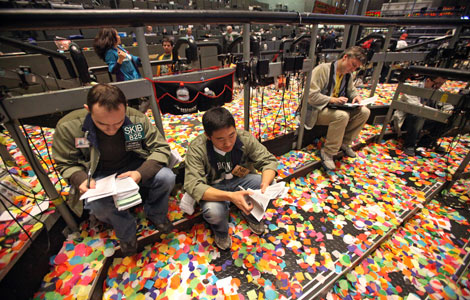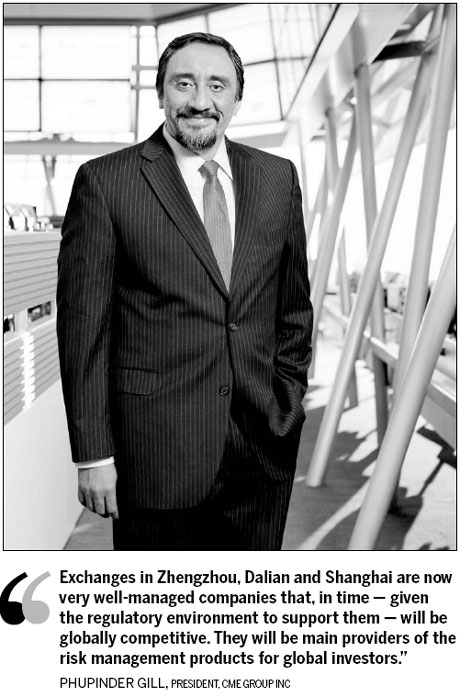Foretelling the future for profit
Updated: 2011-12-01 07:39
By Chen Jia (China Daily)
|
|||||||||
|
 Traders working at the CME Group's Chicago Board of Trade in Chicago, Illinois. The group is talking with Chinese regulators on opening of the country's overseas futures trading business. [Tim Boyle / Bloomberg] |
CME's president awaits the greenlight for the reopening of China's financial derivatives market
BEIJING - Phupinder Gill, president of CME Group Inc, is waiting to enter the financial derivatives market on the Chinese mainland as soon as the country's top regulators give the go-ahead.
The 50-year-old is busy talking with the China Securities Regulatory Commission (CSRC) about concrete measures to start the pilot overseas futures trading business.
When that happens some futures companies from the Chinese mainland will be allowed to buy and sell futures on the Chicago-based international exchange.
"Everything is going well so far, and that will be a milestone for CME's global expansion process," said Gill, who targeted Asia as the next region for the company's worldwide business growth.
China's top regulators closed the door to offshore futures trades 17 years ago because speculative investments were creating financial turmoil amid immature supervision of the financial derivatives market launched in 1990.
"During the last decade, I have seen China's derivatives markets successfully shake off their early challenges. The domestic regulatory institutions as well as exchanges have improved risk management capacity a lot, which has reached world class," Gill said.
Gill became president of CME Group - the world's largest financial derivative exchange by number of products and volume of trade - in 2007, the year that Chicago Mercantile Exchange Holdings Inc merged with Chicago Board of Trade (CBOT) Holdings Inc to become CME Group.
He led the implementation of the company's historic clearing agreement with CBOT in 2003, which helped pave the way for the 2007 merger of the two large institutions.
After acquiring the New York Mercantile Exchange (NYMEX) and the Commodity Exchange Inc (COMEX) in 2008, CME Group offered the largest selection of futures and options for investors from 85 countries.
"CME Group as it stands today is the result of the merger of three US companies. We are seeing the benefits of those mergers now, with record volumes on our markets," Gill said.
"Now we are looking at growing our business across the globe, building our teams in Europe and Asia and working with partner exchanges to internationalize their benchmark products and to create new regionally-relevant benchmarks as well," said Gill.
In August, the volume of contracts traded in CME Group was 17.1 million a day on average, a rise of 46 percent from a year earlier. The company's revenue reached $840 million in the second quarter of this year.
More than 50 registered exchanges, clearing organizations, service bureaus and regulatory agencies throughout the world use CME's Standard Portfolio Analysis of Risk, or SPAN, a system for calculating margin requirements for futures and options.
SPAN has become the industry standard for portfolio risk assessment. In line with the world's largest trading volume of futures and options, the company is seen as having the strongest pricing power in global derivatives markets.
Gill is also seen as one of the most powerful "big guns" in the financial world, as his complex risk assessment and margin calculation system has an efficient price discovery function for international commodity markets. In the eyes of some, his CME Group's adjustment decisions to raise or lower margins can influence future commodity price movements.
The CME Group raised the margin of benchmark gold contracts by 21 percent, from $9,450 to $11,475, on Sept 23, in order to hedge risks of violent price fluctuations. On Sept 26, the following Monday, the price of the COMEX December gold futures decreased by 2.7 percent to the two-month lowest of $1,594.8 an ounce.
Analysts said raising CME's margin added downward pressure on gold prices.
"Well, I am not that powerful actually, and I was misunderstood for years," Gill said, with a big smile on his face.
"The buyers, sellers and speculators participate in the market together. They decide the prices, not the exchange. What we can do is to provide products, services and technology that facilitate risk management and help businesses mitigate the myriad risks they face in today's uncertain global economy," he said, adding that margin calculations are based entirely on risk in the market to ensure all participants are covered against volatility.
Gill, who has been in the exchange for 23 years, always sees risk control as the core of the company's management.
When he finished his bachelor's degree in finance at Washington State University, he came to Chicago. "I thought I want to trade, then I joined the trading floor of the company."
Oct 19, 1987, which was Gill's first day of work, was the infamous "Black Monday" for Wall Street and other global financial centers.
When the markets closed in New York, the Dow Jones index was down 506.32 points, a sharp decline of 22.6 percent. It was the biggest one-day fall record since the year 1941.
"The crash shocked the world, and I was there in the center of the storm," Gill said. On that day, about $500 billion evaporated within six and a half hours, which amounted to one-eighth of the total annual US gross domestic product.
"Great panic was everywhere in global stock markets," Gill recalled of the gloomy days. "I made a decision to join the CME Clearing House in February 1988 and for quite a long time my core work was related to risk management."
Gill participated in the development of the SPAN system and oversaw virtually every function performed by the clearing house, including audits, trade processing and collateral management.
"When I was in charge of risk management, I went to work at 4 am every day. The first thing I did for my daily work was provide stress tests for the exchange members. I would like to give extreme hypothetical situations in the testing, like a sudden drop of 25 percent for the stock index, and make sure that the members could not default," Gill said.
CME Group is unique in that it does a mark-to-market margin calculation twice a day, while other companies only do it once.
According to Gill, on the day that Lehman Brothers Holdings Inc collapsed in 2008, during the subprime mortgage crisis, CME's trading platform operated smoothly. No big defaults happened under the SPAN system.
"At CME Group, I have had the privilege to work with some of the brightest people in the business and have witnessed how these geniuses carried themselves," said Gill.
"The immense lessons that these people have taught me were that the values of perseverance and hard work cannot be substituted when striving for success, and that will be carried by me the rest of my life."
Gill, who was born and raised in Singapore, where more than 70 percent of its population is Chinese, feels no cultural barrier to doing business with Chinese companies.
"Actually, we started cooperation with Chinese exchanges about 20 years ago. Every year, we provided some training programs in China about the benchmark trading platform and risk governance technology. We also invite exchange staff to visit our company in Chicago," he said.
Leo Melamed, former chairman of the Chicago Mercantile Exchange, who was hailed as the father of financial futures, has visited China many times during the last decade. He helped Chinese regulators launch the first stock index futures in Shanghai-based China Financial Futures Exchange.
"Exchanges in Zhengzhou, Dalian and Shanghai are now very well-managed companies that, in time - given the regulatory environment to support them - will be globally competitive. They will be main providers of the risk management products for global investors," Gill said.
"China's double-figure economic growth has become one of the major drivers of the global economy in the last few years. This growth has fuelled demand for food, fuel, construction materials," he said.
"It has also meant that China is changing from an exporter of manufactured goods to a consumer of the finished products. So, for the foreseeable future, China's appetite for commodities is likely to remain high."
CME Group began offering yuan exchange futures on Oct 17 in order to satisfy the increasing needs of settlements of the currency in global markets. Chinese analysts said this might facilitate the internationalization of China's currency.
The company also plans to launch a clearing house in Asia and increase the number of employees in the region.
"The best is yet to be" is Gill's motto that he learned at school - the Anglo-Chinese School in Singapore. "It holds true for most things we do through life," he said.
He said that because fast economic growth in Asia was expected to continue, demand for industrial commodities would increase in the coming months.
Along with the process of globalization in many sectors, especially in the financial world, more risks and fluctuations may emerge, which will require faster innovation in derivative products.
Gill says he is confident about the future business of the CME Group and will never stop seeking out the next opportunity.
China Daily












